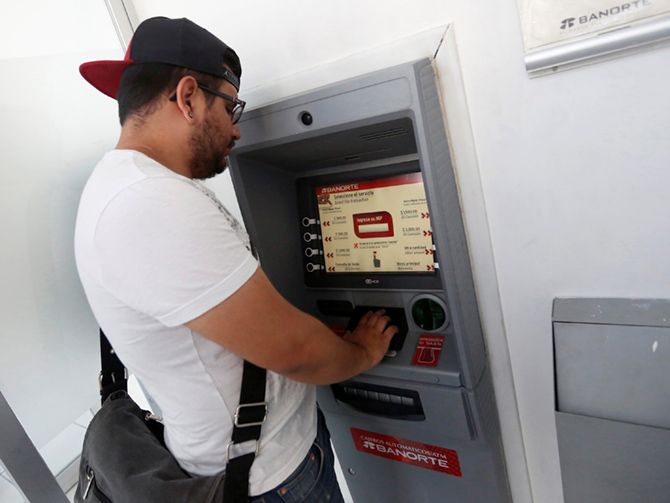 | « Back to article | Print this article |
Private banks and start-ups offer instant loans on apps as well as through ATMs.
Tinesh Bhasin reports.

It's not just large private sector banks that are offering instant loans to their customers through ATMs or via online bank accounts.
Financial technology start-ups are also changing the way personal loans are disbursed to borrowers.
Recently, India's largest private sector lender, ICICI Bank, started offering personal loans to its pre-selected salaried customers through its ATMs.
Only those on the bank's pre-approved customers' list based on their credit score will be able to avail of the facility.
HDFC Bank has been offering instant loans through net banking.
But if you don't have a credit history or a longstanding banking relationship, you can approach start-ups such as EarlySalary.com, LoanTap, and so on.
As these lenders target customers who don't have any credit history, they use a variety of parameters to evaluate the customer's profile.
They judge the spending habits of the customer by looking up his bank account statement.
They also take access to an applicant's social media account and profile them by getting information from the account, such as friends' list, location, etc.
EarlySalary.com offers short-term loans ranging from a day to a month.
Once a person has spent 5 minutes to fill in the loan application on the company's app, the KYC, signing of documents and disbursement can be done within a few hours.
Next time onward the disbursement is instant.
"Around 35 per cent borrowers are new to credit," says Akshay Mehrotra, co-founder and chief executive officer (CEO), EarlySalary.com.
LoanTap offers on-tap credit of up to Rs 5 lakh for periods ranging from one day to five years. But their loan system works like a credit card.
"You can repay a minimum amount and revolve the outstanding, paying interest on it," says Satyam Kumar, CEO, LoanTap.
There are also intermediaries such as Qbera.com which has tied up with RBL Bank, and PaySense, that works with India Infoline Finance.
These fintech start-ups underwrite the loans for partner lenders.
In case of defaults, they also bear the risk.
"Theoretically it's possible for lenders to do the same kind of underwriting that we do, but the reality is that they are not as agile. Their adoption of technology is slow. Also, operating costs for lenders are too high, especially for small-ticket loans," says Aditya Kumar, founder and CEO, Qbera.com.
In case of Qbera and PaySense, borrowers can be both big bank customers and those without a credit history.
"Once we establish a relationship with a customer with the first loan, subsequent loans are disbursed instantly," says Sayali Karanjkar, co-founder and chief operating officer, PaySense.
As availing personal loans gets easier, financial planners say borrowers should not fall for this easy money trap.
If there's a default, these institutions will report it to credit bureaus, and there will be problems when the borrower wants to go for a big-ticket loan such as a housing loan.
While these facilities are convenient, borrowers should use them only in case of an emergency and not to fund their day-to-day expenditure.
"Most financial disasters happen due to an individual's inability to control spending. It's difficult not to get habituated to debt once you have used such a product," says Malhar Majumder, a certified financial planner.
If you have a salary account with a bank, do explore the option of overdraft (OD) facility on the salary that comes at interest rates of 14 to 19 per cent.
Once set up, you can take an OD for up to a year in case of emergencies.
Photograph: Edgard Garrido/Reuters